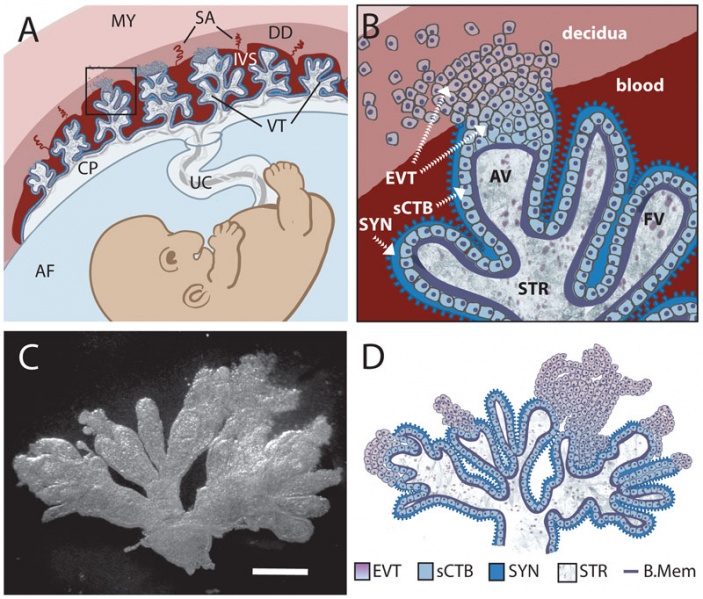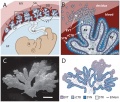File:Placenta and explant model.jpg

Original file (800 × 682 pixels, file size: 153 KB, MIME type: image/jpeg)
Comparison of in vivo placental structure to placenta explant model.
(A) Structure and orientation of fetus and placenta in uterus at ~6 weeks of gestation. Fetal structures are represented in shades of blue and purple while maternal are in shades of red. Maternal structures: MY: myometrium, SA: spiral arteries, DD: decidua (uterine lining during pregnancy), IVS: intervillous space filled with maternal blood. Fetal structures: VT: villous tree, CP: chorionic plate, UC: umbilical cord, AF: amniotic fluid.
(B) (Enlargement of boxed area in panel A) Maternal blood surrounds the villous tree composed of anchoring (AV) and floating villi (FV), which are covered by a syncytiotrophoblast (SYN) that is underlaid by subsyncytial cytotrophoblasts (sCTB) and a basement membrane. The subsyncytial CTB layer grows increasingly discontinuous in later trimesters. Gas and nutrient exchange with the maternal blood occurs across the syncytiotrophoblast to supply fetal capillaries in the stroma (STR). At the uterine wall, extravillous cytotrophoblasts (EVT) anchor the villous tree in the decidua. Some invade the decidua and move away from the tip to remodel maternal spiral arteries, with altered gene expression patterns as they move (not shown). Notably, E-cadherin expression decreases as VE-cadherin expression rises in distal (relative to fetus) extravillous cytotrophoblasts.
(C) A six-week placental explant anchored in Matrigel. Bar = 1 mm.
(D) Cartoon representation of the relevant structures seen in panel C.
Journal.ppat.1000732.g001.jpg
Placental syncytiotrophoblast constitutes a major barrier to vertical transmission of Listeria monocytogenes. Robbins JR, Skrzypczynska KM, Zeldovich VB, Kapidzic M, Bakardjiev AI. PLoS Pathog. 2010 Jan 22;6(1):e1000732. PMID: 20107601 | PLoS
Citation: Robbins JR, Skrzypczynska KM, Zeldovich VB, Kapidzic M, Bakardjiev AI (2010) Placental Syncytiotrophoblast Constitutes a Major Barrier to Vertical Transmission of Listeria monocytogenes. PLoS Pathog 6(1): e1000732. doi:10.1371/journal.ppat.1000732
Editor: David S. Schneider, Stanford University, United States of America
Received: September 29, 2009; Accepted: December 18, 2009; Published: January 22, 2010
Copyright: © 2010 Robbins et al. This is an open-access article distributed under the terms of the Creative Commons Attribution License, which permits unrestricted use, distribution, and reproduction in any medium, provided the original author and source are credited.
File history
Click on a date/time to view the file as it appeared at that time.
| Date/Time | Thumbnail | Dimensions | User | Comment | |
|---|---|---|---|---|---|
| current | 23:59, 21 April 2010 |  | 800 × 682 (153 KB) | S8600021 (talk | contribs) | Comparison of in vivo placental structure to placenta explant model. (A) Structure and orientation of fetus and placenta in uterus at ~6 weeks of gestation. Fetal structures are represented in shades of blue and purple while maternal are in shades of red |
You cannot overwrite this file.